
Peckham Branch of A.S.L.E.& F. was founded
on the 30th January 1912
Newhaven Branch of A.S.L.E. & F. was founded
THE RAILWAY REVIEW
19TH JANUARY 1912
FUSION OF FORCES
"A GREAT SCHEME"
|
At a meeting held In Manchester on December 28th, 29th, 30th, 1911 sub committees appointed by the four organisation who joined together in the national strike of August last met. One organisation, the A.S.L.E. & F., left before a final decision was come to, but the remaining members presented a scheme, which, with one or two slight alterations, was adopted by a joint conference of the three remaining Executive Committees, held at Unity House on Monday, Tuesday, and Wednesday of the present week. The scheme in as following :- On and alter a date to be hereinafter agreed there shall be established an organisation which be entitled "The National Union of Railwaymen." | |
It shall be composed at its inception of the members of the existing railway Trade Union who may decide to join the new body. Any existing railway Trade Union not availing itself of the of the opportunity of joining the new organisation at its inception shall be eligible to join at a later date if they so desire. Any person employed on any railway or in connection with any railway in the United Kingdom shall be eligible for membership. The contributions and benefits of the union shall be the contributions and benefits of the above named societies. Provision shall be made by the E.C. for employment of the employes of the above unions in this union at not less than the pay received and conditions enjoyed at the date of fusion. In the event of any officer or member of the staff of either society not feeling justified in taking the new position he shall be suitably compensated. For the general administration of the work of the union there shall be an E.C. composed of president, secretary, and 24 representatives chosen by members of different districts. For the purpose of electing the E.C. representatives, the country shall be divided into six electoral districts. Within this districts the various grades shall be divided into four electoral departments. Each district shall elect one member from each of the departments named as their representatives on the Executive Committee. The E.C. shall be divided into four departmental sub committees, comprising the representatives of the departments named. it shall be the duty of each sub committee to receive and consider all applications for improved conditions of labour, also to consider any complaints or appeal submitted by any branch or member in the respective departments and to report to the full E.C. Before any improvement for better conditions of labour can be entered upon by any grade or department, it must first receive the sanction of the full E.C. Such sanction having been obtained the departmental sub committee shall conduct the business incidental to the movement. The full E.C. shall consider and decide upon all matters of general finance and matters affecting the whole of the members. Branches of the union shall, where practicable, elect their branch committees on the departmental pattern, and the sub committee shall in the same manner deal with the departmental business of the branch; the full branch committee dealing with the general business of the branch. The electoral departments shall be classified as follows:- Locomotive, Traffic, Goods and Carriage, Engineering Shops and Permanent Way. RESOLUTION The following resolutions were also carried unanimously:- "That this Joint E.C. having carefully considered the report of the Fusion of Forces committee consider the latter scheme therein contained is best suited to effect the purpose desired. We, therefore, decide to submit it to a ballot of the members of the organisations represented here today, and trust that the whole of the members will record their votes in favour of the scheme submitted in order to bring about the unification of the railway unions." "That this Joint Committee deeply regret the absence of the representatives of the A.S.L.E.&F. at this conference, but having regard to the vital importance of our business, which we are satisfied accurately reflects the desires and requirements of the rank and file of every grade in the railway service, felt compelled to proceed to discuss the scheme for a Fusion of Forces submitted to us by the sub committee, and having completed our labours and agreed upon a scheme which in our opinion adequately safeguards the position and gives complete autonomy to every grade in the service, express the earnest hope that the difficulty that now prevents the Associated Society from joining the scheme will be speedily removed, and that all societies will be united with one aim, one policy, viz., to improve the conditions of all grades in the service." |
|
THE RAILWAY REVIEW
19TH JANUARY 1912
L. B. & S. C. LOCOMEN
The man grievances of the men in the loco. department have recently been receiving the attention of the officials on this line, A deputation was received to discuss the grievances ,a and although some were to be rectified and others considered as a result of raw friendly discussion, much more could be done to make the lot of the men, their wives and families a little brighter. The company could avoid the man suspensions from duty, especially where the men are suspended pending inquiry or a decision in any matter which is reported to the head of the locomotive department. To suspend him from duty and deprive them and their families of the necessary funds to live when they are often not in fault is a great injustice, and a more humane system of investigation before punishment might be adopted.
The compelling of men to stay at home on Sundays and visiting the shed to know what duty they have to take up on Monday morning, owing to their being unable to get the duty sheet posted up on Saturdays when the men leave duty, is another grievance. Promises in the past on this matter have been many, but the men still find them broken, and they are still unable to promise the wife or children a day from home when they have a Sunday off.
The latest suggestion of the officials is that a permanent deputation be formed to discuss the grievances of the men with the officials. But would it not be better if the officials would give these matters attention when brought to their notice by the men immediately concerned, irrespective of whether with authority to settle, and not delay consideration with the usual, "It. shall have consideration" or "Is having attention."Nothing done, except creating dissatisfaction among the men
ROUTE KNOWLEDGE AT
BRIGHTON LOCO SHED
Extracted and adapted from the book
Yesterday Once More
By Fred Rich
In 1912, enginemen on the L.B.S.C.R. were still working a 10 hour day which very often
stretched out to 12 hours or more, and in most cases each driver had his own engine
exclusively to himself. Hence for the 126 engines shedded at Brighton at this time there were corresponding number of drivers, fireman and cleaners, in September 1919 the number of enginemen at Brighton loco shed, were approximately 400 in total: 112 drivers, 3 loco yard pilots, 161 firemen and 165 cleaners. Of these, the firemen included some who were passed for driving; and many of the cleaners were already approved for firing duties. Brighton enginemen during this time were working over all the L.B.S.C.R. lines, with the exception of the Hayling Island Branch and the East London Lines.
Brighton men would work turns known as 'Doubles' & 'Rounders' , a 'Double' would
involved working two return trips to London and being in excess of 200 miles and a
'Rounder' would involved working a train from Brighton - London - Portsmouth - Brighton or vice versa, and was slightly less than 200 miles. This type of work was synonymous with the 10 hour day that was being worked at this period of time and each driver having his own
engine: these turns comes to end in 1919 when the introduction of the 8 hour day introduced
and the engines were share between to drivers.
* the 'Doubles' and 'Rounders' would be worked with the introduction of the full electrification of the Brighton lines in 1938.
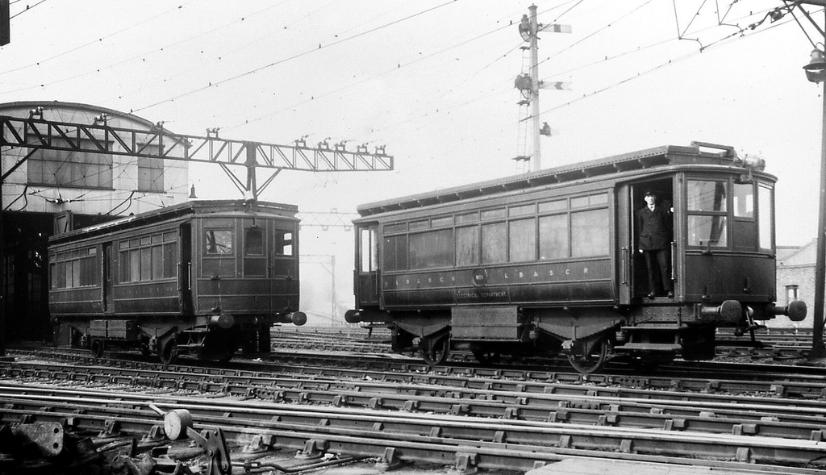
PHOTOGRAPHER UNKNOWN
Peckham Rye Depot
On Thursday 25th January W. Warwick Organising Secretary visited Peckham, with a view to opening a branch of our Society among the Motormen on the London, Brighton and South Coast Railway. W. Warwick returned on the Monday 29th and on Tuesday again visited Peckham, for the purpose of declaring the Peckham branch open. W. Warwick was in no doubt that the Peckham branch will soon embrace the majority of the motormen, as the Peckham Motormen have a lot of leeway to make up in their conditions of service, and the only way they can do it is by organising in our Society and thus joining hands with other electric Motormen.
Already, electric Motormen, they are doing singly what it took two men to do under steam, and for less than half the amount that was paid the Enginemen and Fireman who they have superseded. This kind of thing is growing, for the London, Brighton and South Coast Railway is contemplating further extensions, while at the last yearly meeting, the Chairman of the London and South Western Railway directors told the shareholders he hoped in the near future to be able to announce that their suburban lines were electrified. This means displacing a large number of Enginemen and Firemen, as the Motormen take away the position which rightly belongs to the Locomotivemen.
During February, W. Warwick held meetings at Peckham, and expressed that the Peckham branch is already justifying it’s existence, and if the Motormen will only band themselves together in this their own union, there is every hope that they may in the near future level themselves up to what s paid to their fellow Motormen in the London Tubes. W. Warwick was pleased to learn that many of the latter realise, that if something is not done in the near future they will have to come down to the Brighton motormen’s conditions, which are, to say the least, far below what they ought to be. He found there is a ready response by the London Tube motormen to assist their fellows on the London, Brighton and South Coast Railway, and not only so, but we have it on the best authority that the London and South-Eastern Railway Company is about to electrify its local service, and the footplatemen on that railway will be well advised to be up and doing in regard to this matter, not forgetting that to be forewarned is to be forearmed. The London, Brighton and South Coast locomotive-men were to some extent caught napping when the company opened its electric portion, and that, with the two Societies question, so weakened the men's standing, that after a short skirmish with the general manager for the right of the locomotive-men to fill these positions, and the question of reasonable wages for the responsibility the work entailed, they had to retire without gaining anything, consequently there has been dissatisfaction ever since.
FOR FURTHER INFORMATION REGARDING THE PIONEERING MOTORMEN OF THE L.B.S.& C.R.
SEE SUB-PAGE OF 1909
THE FOUNDING OF
PECKHAM BRANCH OF A.S.L.E.& F.
THE FIRST MOTORMEN ONLY BRANCH OF A.S.L.E.& F.
FOUNDED ON THE L.B.& S.C.R.
THE RAILWAY REVIEW
2ND FEBRUARY 1912
BATTERSEA BRANCH
The rest of the evening spent in harmony. Bro J. Plant, acting as chairman, presented to Bro. F. North (late driver L.B.&S.C.) a marble clock, umbrella, pipe and pouch, and also an umbrella for Mrs North, on his retirement from the L.B.&S.C. Company's service, and in considered of his consistent Trade Unionism. The whole of the gathering, after listening to a few words of thanks feeling expressed by Bro. North, accorded him musical honours. At the previous branch meeting Bro. north was handed the old age grant of £30.
LOCOMOTIVE JOURNAL
FEBRUARY 1912
page 74
BRIGHTON BRANCH
The annual meeting of the above branch which was held on Sunday, December 3rd, 1911,
when, with a few exceptions, the officers of the past year were re-elected. A vote of thanks
was given to the returning officers for the manner in which they had performed their duties.
We are maintaining our membership, with plenty of promises for the New Year. We are
looking forward to having the new Conciliation machinery in working order, so that we can
have a representative deputation to meet our officials at stated periods, to discuss our
business, as has been arranged.
------------
A meeting was held, on December 22nd last, to present Brother Miller with the Benevolent
Fund grant of £38, through his failing to pass the eyesight test. Brother J. Smith, in making
the presentation on behalf of the branch, said that he was pleased that Brother Miller had
had the foresight to be prepared for the misfortune with which he had met, and hoped he
would be successful in his new sphere of life. Brother Miller, in thanking the members, said
that he was pleased that the Society was in a position to provide for the members when they
met with misfortune, as he had and he advised the member to take advantage of and join the
Benevolent Fund.
LOCOMOTIVE JOURNAL
FEBRUARY 1912
page 94
BRIGHTON BRANCH
Sir, Kindly permit me to thank the members for the grant of £38 from the Benevolent Fund. I have subscribed regularly during my period of employment, which was unfortunately terminated by failure to pass the eyesight test. I would like to take this opportunity of trying to persuade all employees to join this fund, because they never know when they may require its benefits.
Your faithfully,
W. Miller
LOCOMOTIVE JOURNAL
FEBRUARY 1912
HORSHAM BRANCH
page 72
On December 17th, at our meeting we had a very good meeting considering the state of the weather, as it was unfortunately, a miserably wet day. After contribution had been called, we proceeded with the election of officers for the ensuing year. After the chairman and vice-chairman were elected. I found to my surprise the members seemed to rally round in a somewhat better spirit than usual, and it was proved to me that they had been working in my absence. Unfortunately I had been on the sick list and had not been in a position to attend the two previous meetings. In the meantime I had sent in my resignation as branch secretary, and from that I soon found the feeling of the members of our branch, because by sending in my resignation I found the members had appreciated my past services. I was surprised when our worthy chairman Brother J. Worcester, called on Brother J. Payne to preside, which no doubt had been previously arranged, and after a well chosen speech from the president. I was more surprised when there was brought forward a beautiful timepiece, which Brother J. Payne presented to me, with my name, with the name of our branch, the initials of our Society and date of presentation inscribed on it; also a lady's handbag for my wife. I can assure all brother members I was utterly astonished. I was so taken by surprise that I seemed almost at a loss to find words to express myself to the member for their kindness. but I am pleased to that I know now the members have appreciated and recognized my past services as branch secretary.
One of my the reasons for the insertion of this in the Journal is that I wish to thank the members again for the assistance they have given me in the past. Another reason is to let the members of other branches know what has been done for me by our branch members. We know at times there is a certain amount of difficulty in getting branch secretaries, and the circulating of these reports up and down the country may at times do a lot in the way encouragement. I do not say I have held the secretaryship as long as some, but I held it since the branch was first opened, nearly 14 years ago. I have received many letters of regret, and I wish to assure all brother members that I shall take as much interest in the branch and Society business in the future as I have in the past. In closing I wish to again express my satisfaction and appreciation for the handsome present, which will be a pleasant reminder to the end of my days of happy times I have had in the branch club-room
EX-BRANCH SECRETARY
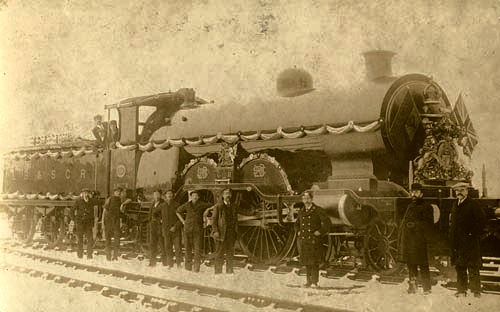
PHOTOGRAPHER UNKNOWN
BOGNOR FEBRUARY 1912
Atlantic Class H1 locomotive decorated in bunting, flags and the royal coat of arms to commemorate the return of King George V and Queen Mary from India after coronation ceremonies
LOCOMOTIVE JOURNAL
Extracted and adapted from
A.S.L.E.F. Organising Secretary W. Warwick's report
MARCH 1912
page 118
I commenced the year by visiting our Battersea Branch secretary (who, I am sorry to say, has had a severe illness), for the purpose of making inquiries re a serious accident which happened to one our members of that branch.
On December (Friday) 15th he received a severe electric shock whilst travelling on a steam engine under a portion of the electrified London, Brighton and South Coast Railway, although I am pleased to say our member is now convalescent. I understand no Board of Trade inquiry will be held.
On the 13th (Jan) I paid another visit to Battersea re the before-mentioned case where our member had received the electric shock.
The following day (Thursday 25th) I visited Peckham, with a view to opening a branch of our Society among the Motormen on the London, Brighton and South Coast Railway. I returned on the Monday (29th) and on Tuesday again visited Peckham, for the purpose of declaring the branch open as mentioned above. I returned not the Monday (29th) and on Tuesday again visited Peckham, for the purpose of declaring the branch open as mentioned above. I have no doubt this branch will soon embrace the majority of the motormen, as they have a lot of leeway to make up in their conditions of service, and the only way they can do it is by organising in our Society ad thus joining hands with other electric Motormen.
Already, electric Motormen, they are doing singly what it took two men to do under steam, and for less than half the amount that was paid the Enginemen and Fireman who they have superseded. This kind of thing is growing, for the London, Brighton and South Coast Railway is contemplating further extensions, while at the last yearly meeting, the Chairman of the London and South Western Railway directors told the shareholders he hoped in the near future to be able to announce that their suburban lines were electrified. This means displacing a large number of Enginemen and Firemen, as the Motormen take away the position which rightly belongs to the Locomotivemen.
INTRODUCTION OF MOTOR-TRAINS
With the introduction of motor-trains complaints of silent running of these trains, especially when operating trailer car first, gave many permanent way men unpleasant shocks before drivers appreciated the dangers before drivers appreciated the danger and made more frequent use of the whistle. A well-known and most successful poacher was heard to complain over his cups to the station master of Eridge that he was no longer able to take a short cut home along the tracks because of the ghost trains.
Driver Thompson and his Fireman Barreyman of Tunbridge Wells, on the 18th March, 1912 worked loco No. 667 ‘Brixton’, worked up to Oxted with the early morning motor-train. Whilst waiting for a connection from London before returning the driver Thompson decided to take water. Unfortunately none could be obtained from the platform cranes for both were frozen, and resort had to be made to a builder’s hose in the goods yard, which necessitated the uncoupling of the trailer car. When the tanks were full Driver Thompson ran back to the car and told Fireman Barreyman to couple up, but did not inspect the job. On getting the right of way, Thompson set off driving from the end of the trailer car and leaving his fireman in charge of the footplate. All went well until approaching Edenbridge Town, when a brake application was made in vain, for Barreyman had connected the four pipes between the engine and the coach incorrectly. By lucky chance the latter was looking out of the cab and realising from Thompson’s frantic signals that all was not well shut of steam and applied the hand brake to stop at the platform. It then came to light that Barreyman was a poor reader and mistook the name tabs attached to the motor-train connections.
In due course this came to the ears of authority, who ordered the painting of the various fittings on both engines and trailer cars in distinctive colours to ensure their correct connection pipes by all concerned. Details are: -
Violet = the regulator pipe,
Yellow = the storage pipe,
Blue = pressure pipe and
Red = the Westinghouse brake pipe.
LOCOMOTIVE JOURNAL
Extracted and adapted from
A.S.L.E.F. Organising Secretary W. Warwick's report
APRIL 1912
page 171
Meetings held during mid-late February I closed my last report with some remarks re the opening of Peckham Branch for Motormen, and I now wish to say that this branch is already justifying it’s existence, and if the Motormen will only band themselves together in this their own union, there is every hope that they may in the near future level themselves up to what s paid to their fellow Motormen in the London Tubes. I’m pleased to learn that many of the latter realise, that if something is not done in the near future they will have to come down to the Brighton motormen’s conditions, which are, to say the least, far below what they ought to be. I find there is a ready response by the London Tube motormen to assist their fellows on the London, Brighton and South Coast Railway, and not only so, but we have it on the best authority that the London and South-Eastern Railway Company is about to electrify its local service, and the footplatemen on that railway will be well advised to be up and doing in regard to this matter, not forgetting that to be forewarned is to be forearmed. The London, Brighton and South Coast locomotive-men were to some extent caught napping when the company opened its electric portion, and that, with the two societies question, so weakened the men's standing, that after a short skirmish with the general manager for the right of the locomotive-men to fill these positions, and the question of reasonable wages for the responsibility the work entailed, they had to retire without gaining anything, consequently there has been dissatisfaction ever since.The following Wednesday I again visited Peckham on branch matters.
The following week I visited Brighton re the ridiculous position of the locomotive-men
on that company's line who are in a deadlock on the Conciliation Board. I have been
attending to this matter on a few occasions since, and at the time of writing have got as
far as issuing petition forms for a re-election under certain clauses in the new Conciliation Agreement as a result of the Royal Commission, and it only remains to be seen what steps the men will take to free themselves from the position as mentioned above. In my next I hope to be able to report progress.
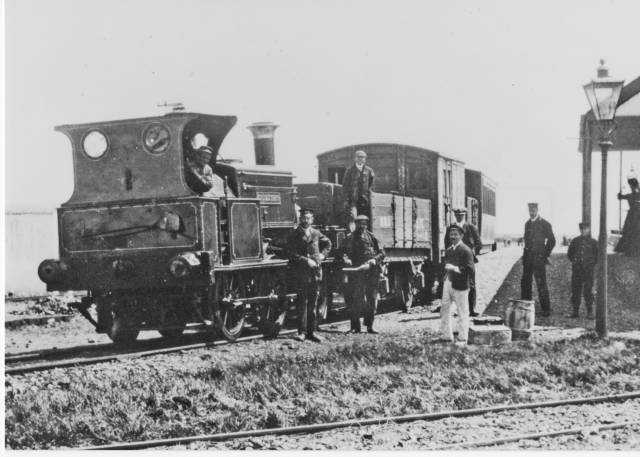
LOCOMOTIVE JOURNAL
APRIL 1912
PORTSMOUTH BRANCH
PAGE 181
At our branch meeting held on Sunday, March 3rd, after getting through our usual branch business, we listened to a most interesting address by Councillor Mactivish. He was appointed as a delegate from the Trades Council, to try and persuade our members to affiliate with that body and should have attended our meeting on February 4th, but owing to ill-health he was unable to do so. He, however, sent two very able substitutes in the persons of Mr. Craig and Mr. Porter, with the result that it was decided to affiliate, whereupon delegates were elected to attend the meetings. Councillor Mactivish in his address dealt with the economic conditions of the workers of today showing how they could help themselves to fight against the encroachments of the capitalist by using the co-operative movement and trade union organizations in a political sense. He quoted figures obtained from the Economist and Board of Trade reports which showed that profits had increased, while owing to the increased cost of the necessaries of life, the ages of the workers have decreased. He spoke very strongly about non-union men and said they were the tools of the employers by which wages were kept down, though at the same time they were quite eager to take advantage of any benefits got by the unions. He pleaded with them to be men and join their respective societies when they would be doing their share towards he uplifting of the workers. He spoke upwards of 40 minutes and at the close announced that he would be pleased to answer any questions on the State Insurance Bill and urged them to make their trade union their approved society. He showed that through their organizations the Act could be further amended as our representatives had succeeded in getting amendments added during the passage of the Bill through the House of Commons. He also said that we as locomotive-men, with a high standard of health, would have a large surplus at our disposal when the valuation took place in three years' time. A question was asked in reference t o the miners' minimum wage which Councillor Mactivish explained and also the conditions under which the miner works. Brother J. Brown, chairman, proposed a hearty vote of thanks to the speaker for his most able and interesting address, and after being ably seconded by Brother R. Stone, it was carried unanimously. Councillor Mactivish suitably responded thanking all present for the kind attention that hsd been given to him. Two new members joined as at the close and that these will not be the last is the wish of
ONE OF 'EM.
THE RAILWAY REVIEW
12TH APRIL 1912

LOCOMOTIVE JOURNAL
May 1912
HORSHAM BRANCH
page 222
SIR,— The above branch held its monthly meeting on March 10th. We had a record attendance, at least that's what some of our oldest members said, and a very good reason why: we had Mr. Warwick, our organizing secretary with us. So we had arranged for an open meeting at 3-30. We got through what branch business we could, and then opened the door to the A.S.R.S. and non members who were waiting to come in.
Brother J. Worcester, who presided, introduced Mr. Warwick, and stated that he had come to explain the Conciliation Agreement to us, and after a few more suitable remarks he called upon Mr. Warwick to address us, which he did in his usual interesting manner. He also explained to us the position our Sectional Board was in, as regards the deadlock, and the necessity for a re-election of the board. He explained to a certain extent the effects the National Insurance Bill would have upon us as A.S.L.E. & F. members, after which some very interesting questions were asked, and satisfactorily answered. The usual vote of thanks was given, bringing a very enjoyable meeting to a close. I am not able to report any new members at present, but we have hopes of shortly claiming a few of the young fellows as members. The older ones appear to me to be casehardened against trade unionism, and are content to let anyone else fight the battle for their emancipation.
SECRETARY
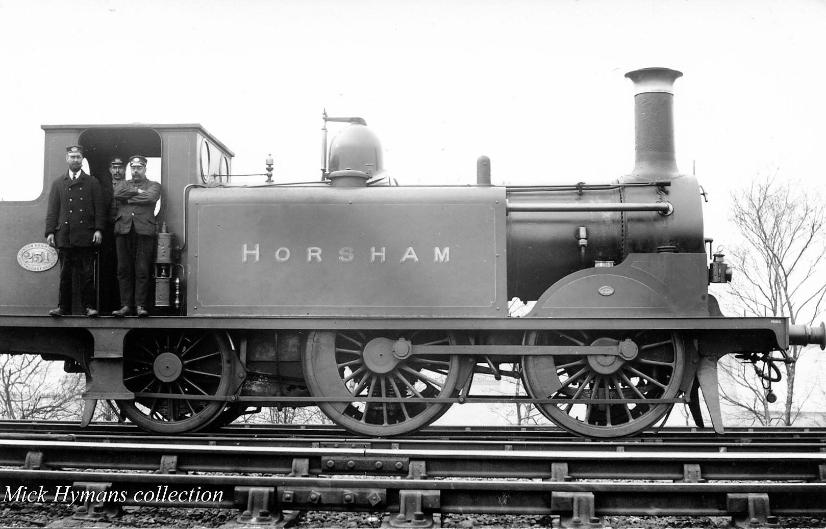
GETTING A CLEAR UNDERSTANDING!!
A minor incident involving Driver O’Corner and his engine No.157 ‘ Barcelona, ‘ on the 11th May, 1912. Whilst Driver O’Corner was shunting coal wagons near Eastbourne loco shed and he mistook the signals, just as C2X No.541 was entering the yard from the main line. The collision was violent and all men were injured, but the actual damage was surprisingly light to both engines.
LOCOMOTIVE JOURNAL
Extracted and adapted from
A.S.L.E.F. Organising Secretary W. Warwick's report
MAY 1912
page 212
I am sorry this report must of necessity be shorter than usual as the fiend influenza has had me in its grip, and has not yet quite release its hold. I am sorry I cannot go as far as I should like re the London, Brighton, and South Coast Railway locomotive-men and their dead-lock on the conciliation board; however, progress is the order of the day, as it has been decided to have a re-election, and it remains to be seen what the men will do now they have their hands free from other grades, and will be able to decide the matter as locomotive-men. Several attempts have been made to draw the red! herring, of working together, across the path, but at present the position is four and four. If the men will be true to themselves and their society in there-election it ought to be six to two at least. If it should be so, the dead-lock will be removed, but what difference that will make to working together I cannot understand, unless, it is to be a question of society rather than the uplifting of the men. Surely we have, as an intelligent body of men, got a stage further than; that. However, it remains to be seen what will be the result, as the re-election has not yet taken place, only a conference or two held for the purpose of preparing a suitable programme for presentation, when the opportune time arrives.
On the Saturday (2nd March) and Sunday (3rd), I attended two meetings at Brighton.On the Sunday (10th) I attended an open meeting at Horsham which was very successful from an attendance point of view, and I hope will prove beneficial all round.
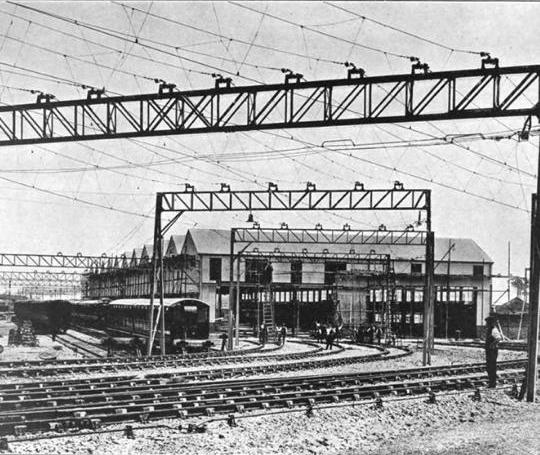
THE THIRD SECTION OF ELECTRIFICATION
PECKHAM RYE TO TULSE HILL
The third and last section of the Elevated Electric opened under auspices of the L.B.S.C.R., was from Peckham Rye to Tulles Hill which included links from Tulles Hill to Streatham Hill and to West Norwood. This enabled two electric services to be run, namely, London Bridge to Victoria, via Tulles Hill, and London Bridge to Crystal Palace.
In view of the coal strike that started on Friday 1st March 1912. Electric train began working on this section on Sunday 3rd March 1912, so as to conserve locomotive coal. The full electric service begun on Monday 3rd June 1912.
On the 16th June, 1912, a delegation of ASLEF members from the Brighton Branch which include Bros. Thomas W. Hatcher (Branch Chairman), Jack Enves (Branch Secretary), F. Smith, J. Smith, Harry Funnell, F. Wilson, Freddie Queen, Albert Pope, G. Thomas, T. Leaney, T. Burtenshaw and Fred Christmas accompanied Mr W. Warwick, ASLEF District Organiser and travelled the short distance to Newhaven, with the intention to encourage the loco-men at Newhaven into forming their own Branch of A.S.L.E.F. The delegation was also accompanied by Bros A. E. Marshall from Eastbourne Branch and Albert (A.E.) Harrison from Battersea Branch (Branch Secretary). A special meeting was arranged to be held at the Co-operative Hall with several Newhaven loco-men in attendance.
Newhaven Special Open Meeting
held at the Co-Operation Hall
on
Sunday June 16th 1912 at 3.0 p.m.
Chairman Bro T. Hatcher, Mr W. Warwick, A.S.L.E.F. District Organiser A.E. Harrison from Battersea Branch, Bros A.E. Marshall from Eastbourne Branch and Brighton Branch members Bros. T.W. Hatcher (Branch Chairman), J. Enves (Branch Secretary), F. Smith, J. Smith, H. Funnell, F. Wilson, F. Queen, A. Pope, G. Thomas, T. Leaney, T. Burtenshaw and F. Christmas, and several Newhaven men.
Bro Jack Enves in a few remarks stated that an effort was made twelve months ago to open a branch at Newhaven but it was not successful. As it was understood that several of the Newhaven men were now unanimous to join our ‘Society’ the present meeting was called to enable the loco-men to form a branch of the ‘Associated Society’ or join a convenient branch. It was pointed out that we had branches at all the depots in the Southern District namely St Leonards, Eastbourne, Brighton & Fratton, and the men of Bognor, Midhurst and Littlehampton with exceptions were members of the Horsham Branch but that see correspondence at each of those depots.
Bro. A.E. Harrison stated that from the experience of his serving the last twelve months in working with the A.S.R.S. he had come to the conclusion that the loco-men cannot get their business satisfactorily endorsed in a branch room consisting of all grades as it is very difficult to get our men together owing to our irregular hours it is best manage our own business by locomotive men only.
Bro. A. Marshall stated that from his experience of the Coastal Depots where loco-men had but two representatives out of eight he was of the opinion that loco-men must manage their own business through their own organisation. He also pleaded with the men at Newhaven to use this influence to get the four ‘Associated’ candidates for the Southern District returned at the forthcoming Conciliation Board elections.
Mr Warwick in a long and interesting address hoped the men at Newhaven would see their way clear to form a branch of our Society. He did not go there to ask them to assist us to form or build up our Society as we were now 24,000 strong with £ 188.000 at our disposal.
We were asking for but 1/- entrance fee when he joined the Society they paid anything up to 10/- and did not know whether the Society would be a success or not. A man joining now practically knew that he was joining a strong and finically sound organisation.
Bro T. Hatcher thanked the speakers on behalf of the meeting for their remarks and appealed for new members. But hoped they would elect a Chairman and Secretary so could manage their own business.
Seven Newhaven men responded by joining with promises from several men who were unable to attend.
It was agreed to form a Newhaven Branch and to elect Chairman and Secretary.
Pro. by A. Pearce, Sec. by L. Lower that Fred Wilmshurst, be the Secretary of Newhaven Branch, Carried Unanimously.
Pro. F. Wilmshurst, Sec. by D. Boyle: - C. Barrow be Chairman of the Newhaven Branch Carried Unanimously.
Pro. by T.W. Hatcher Sec. by H. Funnell:- That the following men be members of the Newhaven Branch,
C. Barrow, F. Wilmshurst, H.G. Bowden, D. Boyle, E. P. Ettridge, A.H. Pearce & L. Lower. Carried Unanimously.
Pro. by T.W. Hatcher Sec. by J. Smith: - That a vote of thanks be given to Bros. Warwick, Marshall and Harrison for attending also for their interesting addresses. Carried.
Pro. by Bro Warwick, Sec. by F. Smith: - That a vote of thanks be given to Chairman for the able manner he had performed his duties and vice of the opinion that we had a most pleasant meeting. Carried.
Bro. Harrison endorsed Mr. Warwick remarks and stated that when they opened the Bricklayers Arms Branch about five years ago it was a most disorderly meeting but the Branch is now 150 strong.
LOCOMOTIVE JOURNAL
JUNE 1912
EASTBOURNE BRANCH
page 272
On Good Friday we held our usual cricket match, super,concert and dance. The cricket match was between the married men and the single, the former showing their superiority by winning. It was followed by a super wholly provided by the members and arranged by the members of a working committee, who had the assistance of their wives. The concert was a great success, Levett, Potter, Watson, Wilson, Sellwood, Jeffery, H. Marshall, G. Major, H. Rogers and A. Marshall contributing songs. Brother F. Taylor gave selections with his gramophone, and during the evening Brother H. Rogers, on behalf of the members, presented Brother G. Major with a walking stick, suitably engraved, on his enforced retirement, caused by the eyesight. Brother Major, in responding, thanked the members for the present. We had the pleasure of meeting Brother R. Niner and other members from the St. Leonards Branch, and a very enjoyable day was brought to close at 1.0 a.m.
Extracted and adapted from
Newhaven Branch Meeting
Sunday July 14th 1912
Delegate gave his report of the Conference held at Brighton on July 11th 1912.
Proposed by Bro. C. Barrow & Seconded by Bro. W. Smith.
"That the Secretary write to the Corresponding Secretary disapproving of Eastbourne proposal of having four & four delegates to submit the programme before the Company and they thought it have been better to have had five A.S.L.E.F & three A.S.R.S. Men.”
Carried.
Newhaven Branch Meeting Sunday July 28th 1912
Letter read from Brighton re 4 & 4 to submit the National Programme, and it was agreed that the Secretary write to Brighton supporting their proposal.
Newhaven Branch Meeting Sunday August 4th 1912
Letters read from the Brighton branch re Joint action in submitting National Programme, and it was thought the reply was satisfactory.
LOCOMOTIVE JOURNAL
page 358
JULY 1912
Extracted and adapted from
A.S.L.E.F. Organising Secretary W. Warwick's report
Meetings held during April.
I also visited our Battersea Branch in connection with matters affecting the London, Brighton and South Coast Railway locomotive-men, more especially as applicable to their re-election of a new conciliation board.
The following day I visited our Peckham Branch on practically the same business, with just this difference, that our Peckham Branch consists of motor-men, whom the company is endeavouring to muddle up in a board consisting of all grades concerned in the working of the electrified portion of the London, Brighton and South Coast Railway. These motor-men
contend that their place is with the footplate-men and are seeking to be grouped with them for purposes of conciliation board business, and I think footplate-men throughout the country will say they are right and be prepared to uphold them as far as possible in the matter. However, the general manager seems to think otherwise, and to us, as practical men, the reason is not far to seek. If I judge the motor-men aright, they are determined to leave no stone unturned in their efforts to be allowed to join hands with their natural allies—the footplate-men ; it will, possibly, be a question for the Board of Trade to decide, and in the meantime it should be impressed upon that department, as clearly and forcibly as possible, that Motormen, for the purpose of dealing with conditions of service, are to all intents and purposes in the same position as the men on our locomotives, and to attempt to muddle them up with other grades will prove about as easy a task as mixing oil with water.
Most of us know that if you place these ingredients together and stir briskly, they appear to mix, but the moment you leave off stirring you are convinced the labour has been all in vain. General managers and other officials may think that when they have issued certain instructions and notices they have succeeded in jumbling up motor-men, or footplate-men, with other grades, but a greater mistake was never made, because directly hours and wages and conditions of service come to be dealt with our men rise to the top and demand to be dealt with separate and distinct. It cannot be too clearly pointed out to the Board of Trade and all concerned, that if they wish the unrest in the railway world to cease, this is one of the things they must accede to, viz., that Motormen and footplate-men are one and that they must be allowed to deal with all matters affecting them from a sectional standpoint.
And now let me say—in case some of our friends may read something into this which is not there, or in the mind of the writer—that the above does not make the slightest difference as far as any agreement which may hereafter be come to in regard to federation ; in fact that is why we refused to go further than federation, simply because we intend to keep the management of our own affairs in our own hands.
The following day (6th May) I visited Battersea, to make inquiries re one of our members who had unfortunately got into the hands of the police. Our secretary, together with our old esteemed friend Bliss, had done all that could be done on his behalf, and the case was adjourned for a week.
I attended the police court, together with Mr. Tippetts, our solicitor, and the above mentioned, but I am sorry to say there was no defence other than the man's previous good character, which did not, in my opinion, count for much with his worship. In my opinion the above could have been dealt with under the First Offenders' Act, because I feel sure the disgrace of the police court proceedings, together with the loss of his situation, would have been sufficient punishment, instead of which it was " two
months' hard.”
The next day (May 7th) I visited our Peckham Branch again in connection with matters mentioned above, but am sorry I cannot report much progress, because the “ powers that be “ seem to have made their minds up that Motormen shall be kept separate and distinct from the footplatemen
On the 24th May, I attended two meetings of our West Brompton Branch, at which the men were discussing their position re the Conciliation board, the manager having suggested two boards for the whole of the employees, which mean the Motormen being tacked on to four other grades, thus placing them in the position of the old Central Board - which the Royal Commission decided must go. These are District Railwaymen, and what I have said re the Brighton Motormen above, applies in this case, but we must “ wait and see” what the result of the men’s application for a Sectional Board will be.
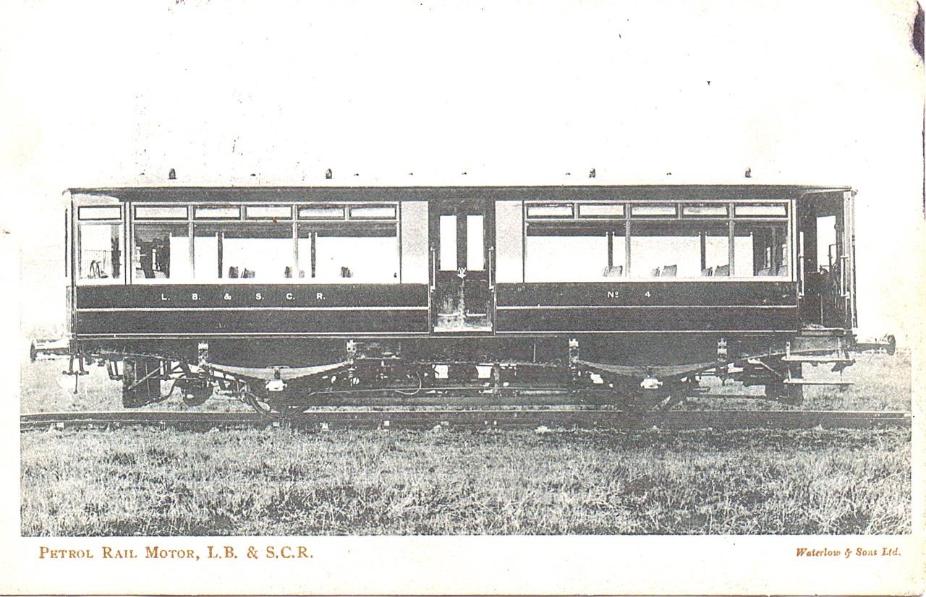
LOCOMOTIVE JOURNAL
page 358
AUGUST 1912
Extracted and adapted from
A.S.L.E.F. Organising Secretary W. Warwick's report
I concluded my last report with some reference to the position of the Motormen on the District and London, Brighton and South Coast Railways re their position under the new conciliation scheme, In both instances the Motormen mentioned above were to be jumbled up with some of the other grades. I am pleased to be able to report now that District men have been able to extricate themselves, and after an appeal to the manager and a vote of the men it has been decided the motormen shall have a sectional board by and through which they can deal with their hours and wages and conditions of service. With the London, Brighton and South Coast Motormen I am sorry to say it is otherwise, the general manager having so far refused to listen to their appeal to be grouped with the footplate-men, with the result that the motormen have appeared before the officials in an application for improved conditions of service, muddled up with passenger guards, signalmen, goods guards, goods shunters, parcels checkers, ticket collectors, &c. I understand each grade laid their case before the officials, when the usual stereotyped reply was given, viz., how much the company had already given in improving the conditions of certain sections, and what the conditions then asked for by the various grades would cost, also the extra cost of coal, cost of Insurance Bill extra cost of material on account of high price of coal, &c, &c.; and then the deputation was told they would receive the decision in due course.
Now the position is as follows: If the decision of the " powers that be " is not satisfactory, and the matter goes to conciliation, the Motormen are in the position of not having a representative on that board, and consequently will have to leave their interests to be looked after by some of the grades mentioned above; and while we are prepared to give the passenger guard, signalman, ticket collector, &c, credit for being wishful to assist the motormen, yet we must realize that, being unable to enter into the worries and responsibilities peculiar to that grade, it is practically impossible for them to represent the same: hence,
as mentioned in last Journal, if the officials of the Board of Trade are anxious that the unrest should cease, one of their first duties is to allow the motormen to be grouped with their own class, the footplate-men.
My next move was to New Cross, re our men refusing to " blackleg" by working trains of that class to the docks. The question of sympathetic strikes is a large and serious one for us as a body seeing that nothing can occur anywhere in connection with the trade and commerce of the country without our men being affected.
I then spent nine days at the Conference, and on returning visited Fulham in the morning and an open meeting at Covent Garden in the evening, and the following day (Sunday 16th June) I left for Newhaven, with the view to open a branch of our Society there. This is rather a small depot on the London, Brighton and South Coast Railway, but quite large enough to maintain a branch. I did the needful by way of visiting, bills, &c., and on the Sunday a few friends from Brighton with Brother Marshall, from Eastbourne, came over to lend a hand, with the result that a branch was opened and arrangements made for the future.
W. Warwick
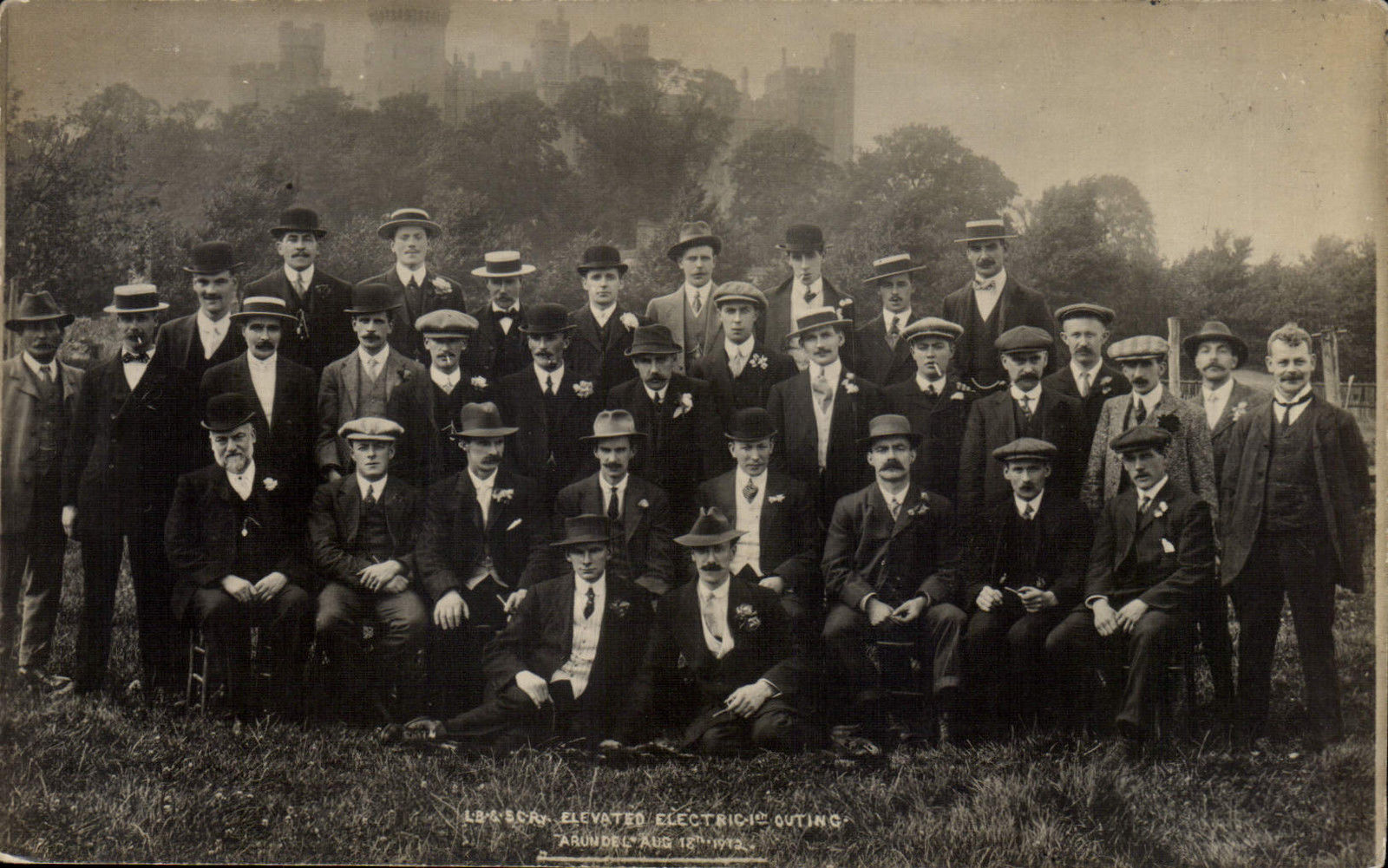
PHOTOGRAPHER UNKNOWN
London Brighton & South Coast Railway Elevated Electric
1st Outing to Arundel on Sunday 18th August 1912.
LOCOMOTIVE JOURNAL
Extracted and adapted from
A.S.L.E.F. Organising Secretary W. Warwick's report
September 1912
NEWHAVEN
Page 409
As intimated in my last report, a branch of our Society was opened at Newhaven on Sunday, June 16th, but owing to not having books, &c, it was necessary for me to pay another visit in order to instruct our new secretary, and to assist in finding a suitable club room, &c. I attended to this on the Tuesday, 25th, and am pleased to state I had but little difficulty in carrying out the above mentioned duties.
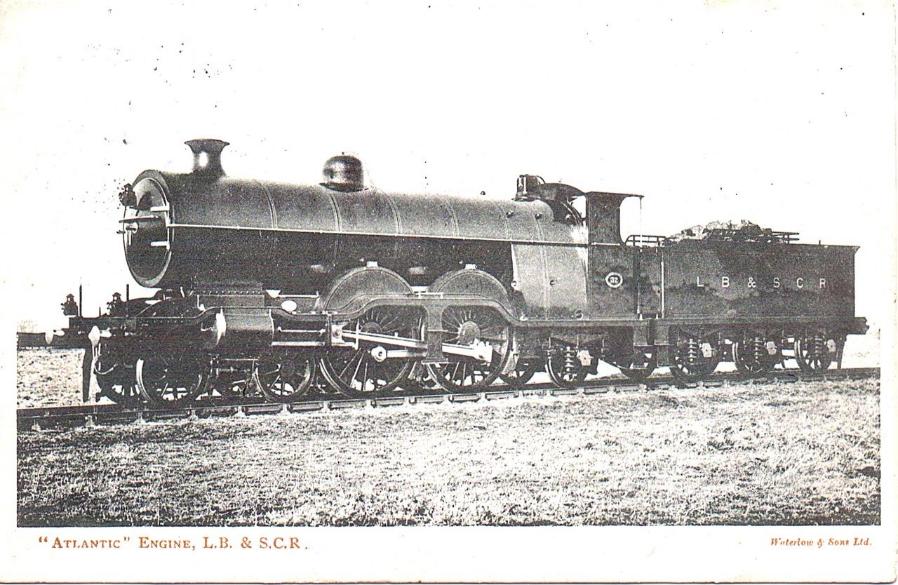
LOCOMOTIVE JOURNAL
Extracted and adapted from
A.S.L.E.F. Organising Secretary W. Warwick's report
LOCOMOTIVE JOURNAL
SEPTEMBER 1912
page 409
As intimated in my last report, a branch of our Society was opened at Newhaven on June 16th, but owing to not having books, &c, it was necessary for me to pay another visit in order to instruct our new secretary, and to assist in finding a suitable club room, &c. I attended to this on the 25th, and am pleased to state I had but little difficulty in carrying out the above mentioned duties.
I returned home on the Monday (1st July), and, during the week, visited our Peckham and Westminster Branches on important business. Peckham Branch is making a heroic attempt to improve the lot of the Motormen on the London, Brighton and South Coast Railway, which is far below that of any other Motormen in or around London; but they have an uphill battle, owing largely to the fact that the company can recruit and train men from the lower paid grades - these men being willing to devote the time necessary to learn a Motorman’s duties free of charge. The irony of the whole thing is that our men have to instruct these men, who seem to think that when they stepped into the position of a Motorman, with all its worries and responsibilities, at the magnificent salary of 33/- per week, they will have found an El Dorado.” However, it is not finished yet, and it remains to be seen where all the cheeseparing will ultimately land those concerned. One thing is certain, it is not doing anything to calm the unrest so much developed, not only by the capitalist, but by the Government itself. These people must know that it is worse than useless to simply go on deploring the unrest, whilst they are doing their utmost to compel men to work year in and year out for less tham a living wage; even where a few SOP have been doled out by the various companies, such as threepence per day to firemen, and a shilling or so per week to cleaners when they reach man’s estate. If anyone is so ignorant, or innocent, as to think such meargre thinks are going to calm unrest they will undoubtedly, in the near future, receive a rude awakening. But to return to the report.
(July) After returning from March I attended a delegate meeting of London, Brighton
and South Coast Railway locomotive-men at Brighton, called for the purpose of drafting
a programme. Our National Programme was taken as a basis, and after it was drawn up
the secretary was instructed as to its presentation. Up to the time of writing this has not
been carried out, so consequently it remains to be seen how the locomotive-men will
succeed on that company. Should the deputation fail, the new conciliation board, now in
course of election, will be ready to take the matter in hand.
On returning home I was called to Peckham, one of our members having had the misfortune to slightly collide with the stops at London Bridge whilst in charge of an electric train. I took the matter in hand and gave the necessary advice, reporting to General Office, so that we may be prepared for any developments in the case. There has been a few already but as the case is
somewhat sub judice I will refrain from dealing further with it in this report, but may have something to say in my next.
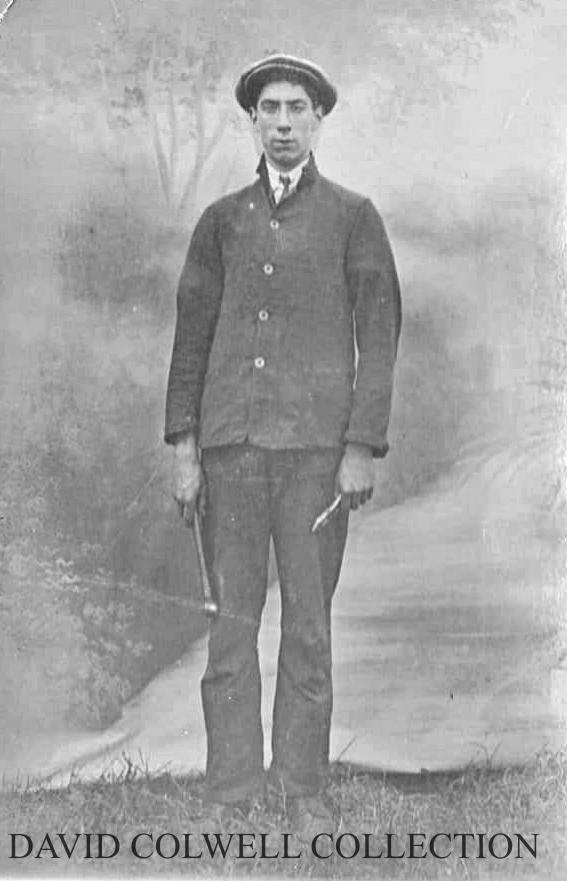
Eastbourne FiremanThomas Frederick Charles PageKnown as Charlie PageSeniority Date 20th September 1912
LOCOMOTIVE JOURNAL
SEPTEMBER 1912
PAGE 429
PORTSMOUTH BRANCH
An open meeting in connection with the above branch was held on Sunday, July 28th, the chair being taken by our E.C. member, Mr. W . Stevenson. Before calling upon Mr. Wride, our worthy President, to give an address, the chairman made a few appropriate remarks. Mr. Wride, who took for his subject Conciliation a n d Federation, and dealt with it for over an hour in a most masterly fashion, gave a brief outline of the history of the A.S.L.E.&F. from its conception and also of the A.S.R.S., which evidently convinced those present that they would" be doing well by looking after their own business, and leave others to do likewise. Mr. W. Stevenson then gave a brief outline of the terms of service enjoyed by the South Eastern and Chatham Railway men, and also particulars of recent concessions granted to the locomotive-men. On the call for questions, of which a few were asked, one referred to the old sore, Rule 30, Clause 5, which still rankles in the minds of a few, and is used as an excuse for running out. Perhaps these members are more to be pitied than anything else.
Another questioner wanted to know if it was true that we are losing members, a' tale which has emanated from some of our A.S.R.S. friends a t another place a few miles away, with what object I will leave yon to guess. This was answered by Mr. G. Wride, who referred to the new branches that have recently been opened. •One always expects to find a few weak-kneed ones, who, when an open meeting is held to clear up their doubts, are most conspicuous by their absence. The following resolution was carried unanimously : " That this meeting of enginemen, firemen and cleaners is of opinion that the time has now arrived when the enginemen of this country should approach the various railway companies for a re- consideration of the conditions of service, with a view of improving the same, exclusively under the auspices of their own Society, the A.S.L.E. & F." A vote of thanks was then proposed to our visitors, Messrs. Wride and Stevenson, for their services, which were greatly appreciated. This was the occasion of their first visit to this branch, and that next time they come we shall have a much larger audience is the wish of
A POMPONIAN.
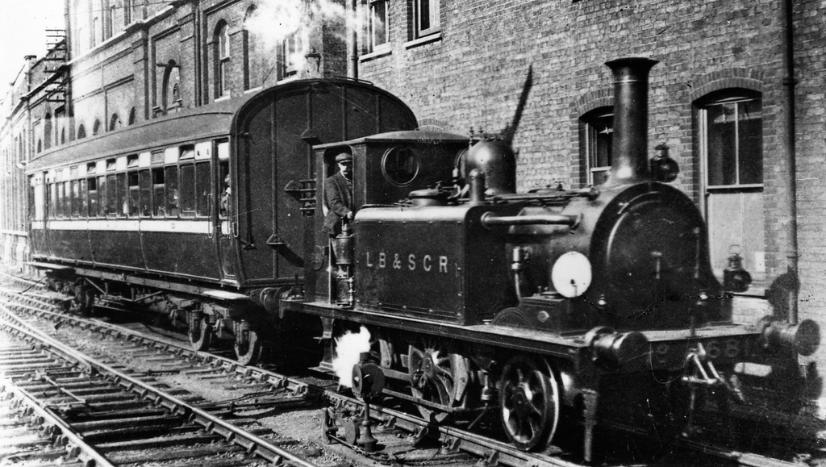
In October 1912 before the review of terms of service for Enginemen, Firemen and Cleaners was published in a memorandum, responding to the proposals for revision by representatives of their grades and discussed by deputations with the Locomotive Engineer by direct negotiations, and not under the conciliation scheme. It was agreed the terms set by the Board be accepted by members of all the grades in full settlement of the whole of their demands, with the reservation that the Locomotive Engineer was instructed to enquire into and report upon the result to certain cleaners, of the system of payment by piecework, compared to payment at daily rates.
In December at a meeting with engine cleaners, Billinton reported that he could not recommend any alteration beyond that sanctioned in the above mentioned minute. This rate was made uniform across the whole system.
Extracted and adapted from
Newhaven Branch Meeting
Sunday October 20th 1912
Letters read from Brighton & Battersea, re better Conditions for Loco-men.
3 days Holidays with pay each year, 10 per cent drivers making 20 per cent to receive.
Drivers when Fireman to receive 5/- a day. First year Driving 6/-, 2nd 6/6.
Passed Fireman when in the Shed to receive 3/3 per day. First year firing 3/9 2nd 4/-, 4th 4/3,
an additional 10 per cent making 20 per cent to receive 4/9 per day.
Increases in pay to start from Friday Sept. 27 from, Holiday from Oct 1st 1912.
Bro. L. Lower proposed & Bro. A. Pearce Seconded.
"That this branch express their obligation for their able manner in which they brought about such a successful settlement and think that we should not have gain any more through the Conciliation Board.”
Bro. W. Smith proposed & Bro. H. Bowden seconded as an amendment.
"That was not satisfied with settlement and thought it ought to have gone to the Conciliation Board as he thought we should have got a weeks holiday and 4/9 for all fireman."
LOCOMOTIVE JOURNAL
Extracted and adapted from
A.S.L.E.F. Organising Secretary W. Warwick's report
October 1912
page 459
After returning from Lowestoft, as per my last notes, I was called to attend a Board of
Trade inquiry at Brighton. In this case a foreman shunter, while walking up the yard in
front of an engine and empty coaches, of which he was in charge, got so close to the rail
that the engine pushed him down, causing slight injury. Our members were not held
responsible or in any way to blame.
From Ipswich I travelled to Brighton, to attend a delegate meeting at which final
arrangements were made for presenting their Programme, and by the time this appears I
expect something will be known as to whether the delegates will be able to settle or
whether the Conciliation Board will be called in to deal with the matter. A re-election of
the above has lately taken place, and the position has been improved from a deadlock of
four from each Society to six A.S.L.E. & F. and two A.S.R.S. The Brighton locomotive-
men have hitherto held a favourable position with regard to conditions of service, but
have of late been left somewhat behind by other companies' men, who have already
made use of the new machinery set up for the purpose of dealing with hours and wages
and conditions of service. However, the London, Brighton and South Coast Railway men
have now again put their hand to the plough and do not intend to look back until they
have fetched up the leeway.
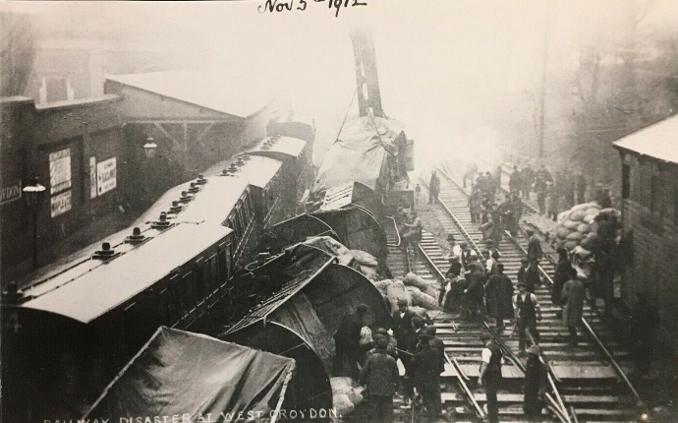
LOCOMOTIVE JOURNAL
Extracted and adapted from
A.S.L.E.F. Organising Secretary W. Warwick's report
NOVEMBER 1912
In September, attended at New Cross to meet the newly-elected London, Brighton and South Coast Locomotive Conciliation Board, for the purpose of electing its officers.
LOCOMOTIVE JOURNAL
NOVEMBER 1912
PAGE 516
L.B.& S.C.R. CONCILIATION BOARD
SIR, - Will you please insert in the Journal for the information of our members that at the meeting of the conciliation board of the London, Brighton and South Coast Railway, Mr. A. Fox, General Secretary, was elected secretary of the board.
A. HARRISON
BATTERSEA BRANCH
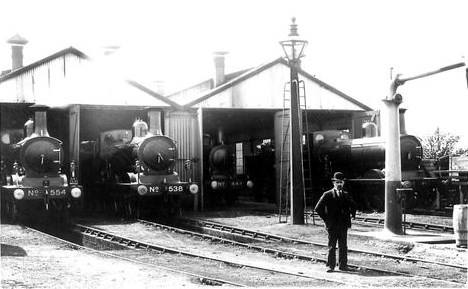
PHOTOGRAPHER UNKNOWN
NEWHAVEN LOCO SHED
Extracted and adapted from
Newhaven Branch Meeting
Sunday Nov. 17th 1912
Letter read from Battersea re open meeting also resolution from Battersea Branch re signatures of all person off men to assert them to get all station pass for them.
Proposed Bro. C. Barrow & Seconded Bro. A. Pearce.
"That this Branch does not think it will be any good having an open meeting for we shall get all the members we are gaining to get without a meeting."
Carried
NEWHAVEN BRANCH MINUTES
Minutes of the Open Meeting
Held at the Co-Operative Hall, Newhaven,
Sunday 1st December 1912
When a good muster was present to hear the report of Bros. Jack Enves (Brighton) & Smith of the recent Concessions granted by the Directors.
Proposed by Bro. F. Smith and Seconded by C. Barrow (Newhaven), 'That Mr Warwick be chairman' Carried.
Mr Warwick (A.S.L.E.F. District Organiser) in a few remarks said no doubt the men knew what had been granted and gave a brief outline how the concessions were brought about and said he would not take up the the time was a lot to be said he would ask Bro. Jack Enves to give his report.
Bro. Jack Enves dealt with some length reading the correspondence that had passed between the Deputation and the Officials and then gave his report of the meeting with the Board of Directors and said they were meeting Mr. Billinton to discuss asking points that they were not satisfied with with re:- 8/- for Drivers, 4/9 for Firemen and holidays for Passed Cleaners, also passes for Firemen.
Bro. Smith said he did not think he could say any more than Bro. Jack Enves had said but he felt confident that when they went next time they would get a weeks holidays and thanked all present for their support and hoped they do the same next time as they need not be afraid as the officials did not look at the signatures.
Mr. Warwick then made a few remarks with regards to the concessions of other railways and said the Company worked on a basis one with another and said he did not think the Company had given much away as his opinion was that the Loco - Men were the back bone of the Company and urged all men to belong to their own Organisation, then they could demand what they wanted several questions were then asked and answered in a most able manner by the Chairman and he said he hoped he hoped he would be able to come and see them again, this brought to a close a very successful meeting when Bro. Fred Wilmshurst (Newhaven) proposed a vote of thanks to the Chairman seconded by A. Pearce (Newhaven).Mr. Warwick replied and proposed a vote of thanks to Bros. Enves & Smith seconded by G. Wise. Bros. Jack Enves & F. Smith replied.
See W. Warwick's Locomotive Journal Report FEBRUARY 1913
LOCOMOTIVE JOURNAL
DECEMBER 1912
WEST CROYDON BRANCH
PAGE 567
On November 10th two open meetings were held at the Bridge Inn, West Croydon, the club-room of this branch. Brothers J. Cordrey and A. E. Harrison gave a full report of the interviews with our locomotive engineer, Mr. L. Billinton, and the board of directors of the London, Brighton and South Coast Railway. The attendance at the first meeting, which commenced at 12.30 p.m., was not as large as we expected, but those locomotive-men' who did attend were greatly interested in the reports given by both of the delegates, while their appreciation was signified by passing a vote of thanks to the delegates, with which was coupled an invitation for them to attend West Croydon Branch at some future date. A very interesting fact in connection with this meeting was that we had a member of the A.S.R.S. as chairman.
The attendance at the evening meeting showed a great improvement upon the •earlier one, many locomotive-men coming over from Epsom in order to hear at first hand of the concessions which had been granted to the footplate workers on this line. At this meeting several grievances were discussed, when the general opinion seemed to be that if the complaint was made in the proper quarter these grievances would soon be rectified. Both delegates repeated their report, which was satisfactorily received, after which several questions were asked, all of which were answered to the gratification of our members. After this was finished there was only just time to propose a vote of -thanks, which was carried unanimously, to Brothers Cordrew and Harrison for i:heir attendance and their lucid explanations of the concessions.
Having held a special meeting to discuss the making of a presentation to our delegate, Brother P. Wright, London, Brighton and South Coast Railway, it was resolved to invite Brother A. Harrison, who was chairman of the deputation, to take the chair at an open meeting to be held at the Co-operative Hall, Gamier St., Fratton, on Sunday, November 17th, for this purpose. It was also proposed and carried that we invite Brother J. Cordrey, another of the delegates, to attend and give an address. The meeting eventually took place at the arranged time, when our chairman, in his opening remarks, thanked the members of the Portsmouth Branch for the invitation which they had given him for the second time in two years, and said it gave him pleasure to be amongst those once more with whom he had spent his cleaning days, but more so because since his last visit as their chairman he was informed they had seen proper to organize themselves nearly to a man, therefore encouraging those who were elected to represent them before the chief engineer and board of directors. The chairman addressed the meeting for 30 minutes, after which he called upon Brother J. Cordrey to give a full report of the meeting with the locomotive engineer and the board of directors, and the concessions granted by same. After this was done a number of questions were asked and answered to the questioners' satisfaction.
The chairman, on behalf of the men, then presented Brother P . Wright, delegate from Portsmouth, with a handsome marble clock, and in his remarks stated that it was a pleasure to be there to present this token of appreciation from the men, as it was a recognition of the good work done by him on their behalf. Brother P. Wright very suitably replied, after which the meeting closed at 2.0 p.m.
Nearly every London, Brighton and South Coast Railway locomotive-man attended this meeting, as well as some London and South-Western Railway men, and it has left a good impression.
ONE OF THE BOYS.
LOCOMOTIVE JOURNAL
DECEMBER 1912
BY RAIL ACROSS THE ENGLISH CHANNEL.
By FELIX J. KOCH
Perhaps no one report has caused so much interest in transportation circles, the world about, as that of a train-ferry being established across the English Channel. Tourists from the United States
in particular, who have writhed and groaned with the mal-de-mer when making the Channel crossing, will no doubt be among the most grateful at the innovation.
According to news just come from Rouen, the much-discussed question of establishing ferry-service between Dieppe, France, and Newhaven, England, is likely to soon become an established fact.
At present, passengers and freight are transferred, at one city or the other, from the railway cars to steamers, transported across the English Channel and again loaded on the railway. By having ferry steamers, upon which the entire train could be transported without disturbing passengers and freight, not only would much annoyance and expense be saved, but also a considerable amount of time, now necessary to make these transfers, would be cut off in trips between London and Paris.
To undertake this service an Inter- national Railway Company was formed in the year 1910. It now states that negotiations with an English railway have been favourably received, and that a Bill permitting the establishment of the ferry has passed the British Parliament. The railway in question, with the French West State Railways, own and operate the steamers now running between Dieppe and Newhaven, and it is therefore considered certain that the other line involved will agree to this plan.
The new ferry will not exceed in length the one which has been so successful between Sweden and Germany. It is hoped to have the project inaugurated within a year.
To Americans, of course, it recalls, in miniature, the great railway ferry across the Mississippi, some few miles beyond New Orleans, or, again, across the Straits of Canso, at Mulgrave, in Canada, or over the Detroit River at the Michigan City.
Of course, the experience on each is almost identical. At New Orleans, taking this for example, before one-half suspects it, the train has run on to a boat fitted with three tracks, on each of which some of the cars have been switched. Then one is ferried across. Usually some of the passengers are glad of the chance to climb up into the cab of the engine and study its construction. Above rises the bridge, with the ferry operators—all about is the muddy water, and beyond, again, the great crescent that marks the city.
One feels a slight shaking underfoot as he walks around the boat, otherwise you would not know you were moving. In fact, when one takes his seat in the dining- car, before the other bank is reached, he will have become used to it and feel wholly unconscious of motion.